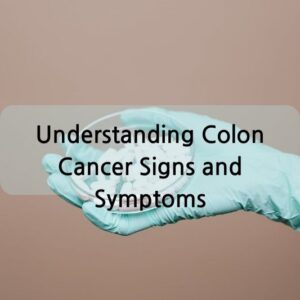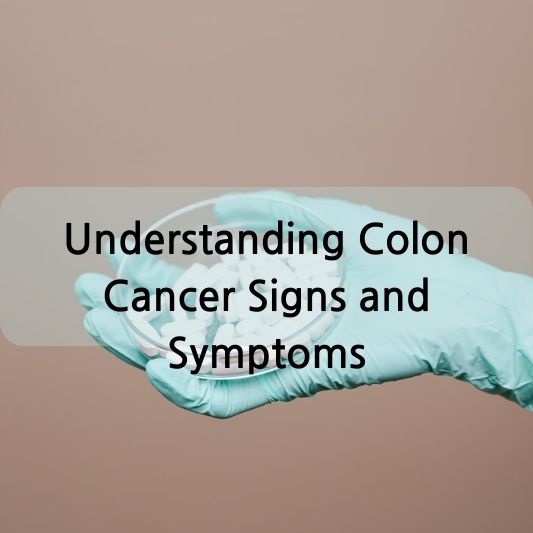Colon cancer is a prevalent form of cancer that affects the large intestine or the rectum. Recognizing the signs and symptoms of colon cancer is crucial for early detection and effective treatment. Here’s a detailed overview of the signs and symptoms associated with colon cancer.

Colon Cancer Early Signs and Symptoms
- Changes in Bowel Habits: Persistent changes in bowel habits such as diarrhea, constipation, or narrowing of the stool may indicate colon cancer.
- Blood in the Stool: Rectal bleeding or blood in the stool could be a sign of various gastrointestinal issues, including colon cancer.
- Abdominal Discomfort: Persistent abdominal discomfort such as cramps, gas, or pain may occur, especially if it persists for an extended period.
- Unexplained Weight Loss: Sudden and unexplained weight loss without changes in diet or exercise could signal underlying health issues, including colon cancer.
- Fatigue and Weakness: Persistent fatigue and weakness may accompany colon cancer, often due to anemia caused by rectal bleeding.
Advanced Signs and Symptoms
- Obstruction: Advanced colon cancer may lead to bowel obstruction, causing severe abdominal pain, bloating, and an inability to pass stool or gas.
- Nausea and Vomiting: Persistent nausea and vomiting, especially coupled with abdominal discomfort, may indicate advanced stages of colon cancer.
- Anemia: Chronic blood loss from the colon can lead to anemia, resulting in fatigue, weakness, and shortness of breath.
- Jaundice: In rare cases where colon cancer spreads to the liver, jaundice may occur, causing yellowing of the skin and eyes.
Risk Factors Associated with Colon Cancer
Several factors increase the risk of developing colon cancer. Understanding these risk factors can help individuals take preventive measures and undergo regular screenings.
Age and Family History
- Age: The risk of colon cancer increases with age, particularly after the age of 50. Individuals aged 50 and above are recommended to undergo regular colon cancer screenings.
- Family History: A family history of colon cancer or polyps increases the risk of developing the disease. Individuals with close relatives diagnosed with colon cancer are at higher risk.
Lifestyle Factors
- Unhealthy Diet: Diets high in red and processed meats, and low in fiber, fruits, and vegetables, may increase the risk of colon cancer.
- Lack of Physical Activity: Sedentary lifestyles and lack of regular physical activity contribute to the risk of colon cancer.
Medical Conditions
- Inflammatory Bowel Diseases (IBD): Chronic inflammatory conditions of the colon, such as ulcerative colitis and Crohn’s disease, increase the risk of colon cancer.
- Inherited Syndromes: Certain genetic syndromes, such as familial adenomatous polyposis (FAP) and Lynch syndrome, predispose individuals to colon cancer.
Diagnostic Methods for Colon Cancer
Early detection of colon cancer significantly improves treatment outcomes. Several diagnostic methods are used to detect and diagnose colon cancer.
Colonoscopy
- Gold Standard: Colonoscopy is considered the gold standard for colon cancer screening and diagnosis.
- Visual Examination: During a colonoscopy, a flexible tube with a camera is inserted into the colon to examine the inner lining for polyps or abnormalities.
Stool Tests
- Fecal Occult Blood Test (FOBT): FOBT detects hidden blood in the stool, which may indicate the presence of colon cancer or polyps.
- Stool DNA Test: Stool DNA tests analyze stool samples for genetic markers associated with colon cancer.
Imaging Tests
- CT Colonography: Also known as virtual colonoscopy, CT colonography uses CT scans to produce detailed images of the colon and rectum.
- Barium Enema: A barium enema involves the insertion of a contrast material into the colon followed by X-rays to detect abnormalities.
Treatment Options for Colon Cancer
Treatment for colon cancer depends on various factors, including the stage and location of the cancer, as well as the overall health of the patient.
Surgery
- Primary Treatment: Surgery is often the primary treatment for early-stage colon cancer. The surgeon removes the cancerous portion of the colon and nearby lymph nodes.
- Colostomy: In some cases, a colostomy may be required, where a portion of the colon is diverted to an opening in the abdominal wall.
Chemotherapy
- Adjuvant Therapy: Chemotherapy may be recommended after surgery to kill any remaining cancer cells and reduce the risk of recurrence.
- Palliative Chemotherapy: In advanced stages of colon cancer, chemotherapy may help control symptoms and improve quality of life.
Radiation Therapy
- Localized Treatment: Radiation therapy may be used to shrink tumors before surgery or to relieve symptoms in advanced cases.
- Combined Approaches: Radiation therapy is often combined with surgery and chemotherapy for more effective treatment.
Preventive Measures and Lifestyle Changes
Taking proactive steps to reduce the risk of colon cancer is essential for maintaining overall health and well-being.
Healthy Diet and Exercise
- High-Fiber Diet: Consuming a diet rich in fruits, vegetables, and whole grains can help prevent colon cancer.
- Regular Exercise: Engaging in regular physical activity, such as brisk walking or jogging, reduces the risk of colon cancer and promotes overall health.
Regular Screening
- Colonoscopy: Regular colon cancer screenings are recommended, especially for individuals aged 50 and above or those with a family history of the disease.
- Stool Tests: Fecal occult blood tests and stool DNA tests should be performed according to the recommended screening guidelines.
Supportive Care and Survivorship
Living with colon cancer requires ongoing support and care to address physical, emotional, and psychological needs.
Support Groups
- Peer Support: Joining support groups or online communities can provide encouragement, understanding, and valuable information for individuals diagnosed with colon cancer.
- Counseling Services: Professional counseling services offer emotional support and coping strategies for patients and their families.
Survivorship Programs
- Long-Term Follow-Up: Survivorship programs provide long-term follow-up care, including regular check-ups, screenings, and support services.
- Health and Wellness: These programs focus on promoting overall health and wellness, addressing the unique needs of cancer survivors.
Conclusion
Understanding the signs and symptoms of colon cancer is crucial for early detection and effective treatment. By recognizing the risk factors, undergoing regular screenings, and adopting healthy lifestyle habits, individuals can reduce their risk of developing colon cancer and improve their overall quality of life.
FAQs
Q: What are the most common symptoms of colon cancer?
A: Common symptoms include changes in bowel habits, rectal bleeding, abdominal discomfort, unexplained weight loss, and fatigue.
Q: At what age should I start screening for colon cancer?
A: Screening for colon cancer is typically recommended starting at the age of 50 for average-risk individuals. However, individuals with a family history or other risk factors may need to start screening earlier.
Q: Can colon cancer be prevented?
A: While not all cases of colon cancer can be prevented, adopting a healthy lifestyle, undergoing regular screenings, and managing risk factors can significantly reduce the risk.
Q: What is the survival rate for colon cancer?
A: The survival rate for colon cancer varies depending on the stage at diagnosis and treatment received. Early detection and treatment offer the best chance of survival.
Q: Are there any alternative treatments for colon cancer?
A: While surgery, chemotherapy, and radiation therapy are standard treatments, some patients may explore complementary and alternative therapies. It’s essential to discuss these options with healthcare providers.
Learn more about colon Cancer!
